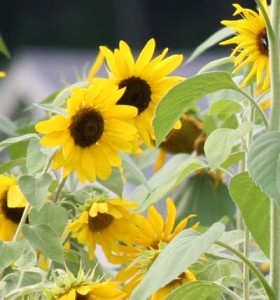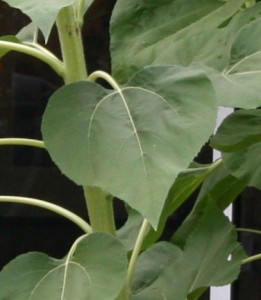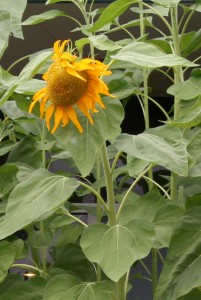Sunflower
Sunflower – Helianthus annuus
Common names:
common sunflower, Kansas sunflower
Years ago when I would go hiking and find a few sunflowers growing in a field I assumed they were “escapees” from someone’s garden or seeds dropped by a bird. How wrong I was. They are native plants of the Americas. As its name indicates, the sunflower is named for its huge, flower heads, whose shape and image are often used to depict the sun. Additionally, they have long been used by Native Americans as a food source and medicinal aid.
Description:
Frankly, sunflowers are iconic. Once you have seen one you will never make a mistake in identification. But for those that want a description of a sunflower, here goes – Sunflowers are large annual plants that commonly grow to heights between 5’ – 12’. As can be seen in the pictures, they have rough, hairy stems, broad, coarsely toothed, rough leaves and circular heads of flowers. The leaves are mostly alternate, egg-shaped to triangular, and entire or toothed. The heads consist of many individual flowers which mature into seeds, often in the hundreds, on a receptacle base
 Habitat:
Habitat:
Many times you will find sunflowers growing along a roadside in a sunny spot. They need full sun for optimum growth. They grow best in fertile, moist, well-drained soil with heavy mulch. However, I have found as long as a seed can germinate in decent soil and have enough sun, it will grow.
Location:
The sunflower is common and widespread. It can be found in all of the contiguous 48 states, all of Canada and Alaska.
Edible:
Sunflower seeds can be eaten raw, roasted, cooked, dried, ground into flour and used as a source of oil.
Native Americans made a meal with parched seeds that were pounded in a mortar and mixed with beans, dried squash and pounded parched corn.
Sunflower seeds can be processed into a peanut butter alternative, sunflower butter.
Roasted seeds can be used as a coffee substitute much like chicory.
Notes of Interest:
Traditionally, several Native American groups planted sunflowers on the north edges of their gardens as a “fourth sister” to the better known three sisters combination of corn, beans, and squash.
Their seeds are commonly used as a wild bird food.
Purple, yellow and black dyes can be extracted from wild sunflowers.
As is all too often, sunflowers have been exported around the world. Frankly, even though they are beneficial plants, I would consider them invasive in areas they have been introduced.